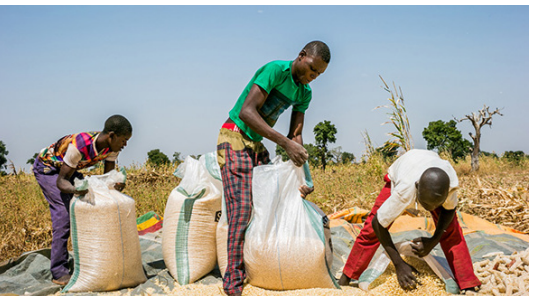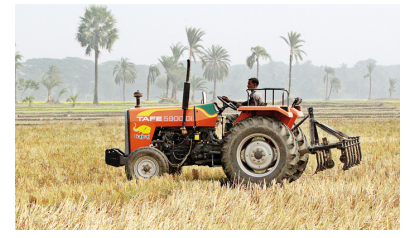According to Wikipedia, famine is a widespread scarcity of food, caused by several factors including war, natural disasters, crop failure, population imbalance, widespread poverty, an economic catastrophe or government policies. Famine does not continue indefinitely, as it only lasts for a few months or years. If it goes on for ‘seemingly infinity’, the population affected by the famine slowly becomes decimated as people begin to die of hunger. For famine to be declared as existent in any population, the following situations must be true
• At least 20% of the population face food shortages and possibility of survival among them is low.
• At least 30% of children in the area considered suffer from acute malnutrition.
• At least 2 out of every 10,000 people die of hunger every day.
Famine in Africa: How Did We Get Here?
Over the years, the African continent has been rocked by conflicts, political instability and drought. These situations have brought various regions to their knees and one of the evidences is famine. Several African countries have struggled with the consequences of these situations without any support from government, communities, organizations and individuals. Even after the ‘storms’ are over, the process of recovery is affected by another wave of problems. In more recent times, a common enemy has ravaged areas affected by poverty. The COVID-19 pandemic has seen poor regions in Africa plunge deeper into poverty and it has negatively impacted people; especially women and young children. During the pandemic, a lot of Africans lost their means of livelihood, lacked basic amenities of life and even suffered mental breakdowns. Also, lack of social amenities have contributed to poverty in Africa, as a lot of farmers grow and harvest their crops in rural areas. These rural areas have very bad roads which become inaccessible during the rainy season. With these bad roads, they cannot transport their goods to the market for sale; causing food shortages in markets and loss of income for farmers whose crops are sometimes perishable. Facts About Famine In Africa Here are some things you need to know about famine and hunger crises in Africa: • 282 million Africans were said to be undernourished at the end of 2020; 49 million more than the figure at the end of 2019, with the COVID-19 pandemic playing a huge role.
• One in five Africans faced hunger in 2020.
• Children under the age of 5 are the most vulnerable to malnutrition caused by famine, as they lack nutrients necessary for their growth.
• More than 7 million people in East Africa, which is worst hit by famine- have edged closer to starvation because of conflict and economic impacts of the COVID-19 pandemic.
• 12.8 million East African children are also at the risk of acute malnutrition.

What Can African Countries Do?
While famine is not a situation anybody prays for, there are certain steps that can be taken by African countries in order to manage and eliminate famine. Some of the things these countries can do include: 1. Empower Farmers and Connect Them to Markets
Though a lot of African countries have fertile lands where farmers can thrive, they do not show enough support to these farmers. The farmers are left with outdated farming tools which reduce productivity; and they cannot even get their crops into markets because of factors like bad roads. Famines caused by food shortages are supposed to serve as reminders that African nations do not invest enough in Agriculture. In times like these, there should be more orientation programs for farmers; highlighting the mistakes they could have made and how to improve output. They should also provide modern farming and storage facilities to these farmers to help them increase yield. Loans or grants can also be given to encourage expansion as the more these farmers expand their farms, the more the productivity. Of what use is helping farmers increase productivity if there is no link between them and the market? Farmers should be helped to allow their products get to the final consumers, who will definitely pay much more to get imported products. Roads should be constructed (or reconstructed in most cases), for easy transportation of farm produce from agricultural areas to urban settlements. This way, both the farmers and consumers benefit.
2. Promote Adult Literacy
The African country currently worst hit by famine is South Sudan, which has a 65% illiteracy rate; one of the highest in the world. In general, some 182 million people in Sub-Saharan Africa are not educated which means one in every three persons cannot read. It might sound like its wrong timing, but the time of famine is actually a good time to sensitize people and encourage formal education. In most parts of Africa that are affected by famine, literacy levels are very low and this makes them tend to make mistakes during the period of famine. A good example is a woman with 5 children all fleeing areas affected by famine; due to illiteracy, this woman might still get pregnant and have another child, while her and her other kids are barely surviving. African countries need to start promoting literacy by organizing orientation programs to discourage issues like the one in the example. Of course, these orientation programs should be convincing and ‘people oriented’, as these people affected by famine would not pay enough attention with their stomachs being empty.

3. Promote Democracy
Switching to democracy might not be a feasible step to managing or ending famine, but it could come in handy. Around the world, democracy is known to be the most stable form of government and what kind of unstable government would easily handle famine? Most famines in Africa are caused by coups, bad government policies and genocides; all of which do not happen in a democratic system of government. Democracy might not fill the stomach but it definitely has the right tools to deal with crises.
4. Request for assistance
A lot of countries in Africa do not have the capacity to fight crises like famine, all by themselves. Any country affected by famine should realize that it needs help from individuals, N.G.Os , private sector companies and other countries. Assistance helps reduce the burdens on the affected country and also speeds up the recovery process. This assistance could be in the form of food, water, cash, medicine, human volunteers and others.
5. Gather Accurate Information about Famine Crisis
With the right statistics gathered, it would be easier for African countries affected by famine to device strategies to be used. Today, lack of data remains a problem in African countries; these African countries do not know the exact amount of citizens they have and other necessary details about them. If they can find a way to get the information needed about famine, they will have a specific target and know how to hit it.
